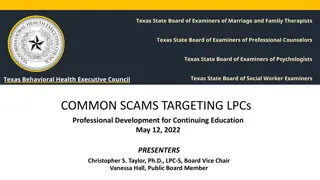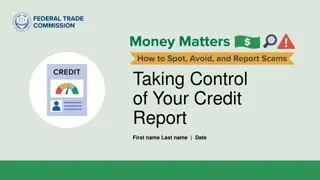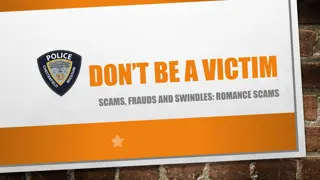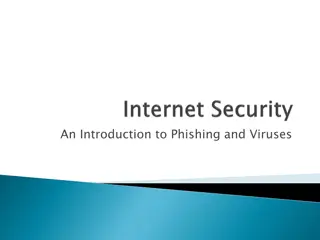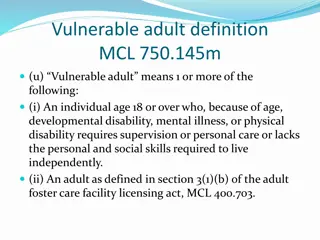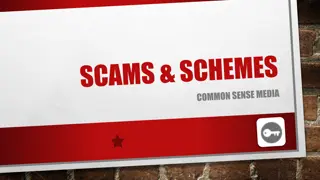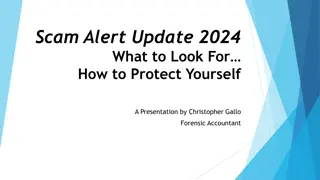Protect Yourself: Identifying and Avoiding Scams
Learn how to recognize scams, understand why they work, explore types of scams, and discover warning signs to build defenses against scammers. Explore the profiles of scammers, how they find victims, and the emotional tactics they use. Find out about various scams such as giveaways, imposter scams, and more, along with tips on solving the scam problem to protect yourself.
Download Presentation

Please find below an Image/Link to download the presentation.
The content on the website is provided AS IS for your information and personal use only. It may not be sold, licensed, or shared on other websites without obtaining consent from the author.If you encounter any issues during the download, it is possible that the publisher has removed the file from their server.
You are allowed to download the files provided on this website for personal or commercial use, subject to the condition that they are used lawfully. All files are the property of their respective owners.
The content on the website is provided AS IS for your information and personal use only. It may not be sold, licensed, or shared on other websites without obtaining consent from the author.
E N D
Presentation Transcript
Identifying and Avoiding Scams
What Well Discuss What a scam is Why scams work Types of scams Warning signs of scams Building scam defenses
What Is a Scam? A scam is a trick a con artist plays on an unsuspecting victim The goal is to extort money If the scam succeeds, the victim s money is gone and so is the scammer
The Pattern of Fraud Scammer Victim s Assets Scam Victim
Profile of a Scammer A master of persuasion with a plausible story, or the ultimate salesperson with a tempting offer. Easily pinpoints a victim s vulnerabilities Quickly gains trust Shows no mercy
How Scammers Find You Buy contact information Prowl online and on social media sites Infiltrate groups to which you belong Go door-to-door
Scammers and Victims Scammers are highly skilled at their trade Appeal to emotions: sympathy, fear, loneliness Don t take no for an answer Insist on secrecy Victims are vulnerable
Solving the Scam Problem The scam problem has one solution: knowing how to protect yourself To do that, you must recognize a scam when you see it!
The Variety of Scams Giveaways: winning prize, lottery, free trip Imposter scams Phony charities Investment tips or deals too good to pass up Home repairs and other home-based scams Tax scams
Giveaway Scams Letter, email or call that s thrilled to announce you re a winner Requires an immediate response Requests up-front payment to Release winnings Secure the reservation Prepay taxes
Imposter Scams Urgent call from scammer posing as family member or dear friend Family member or caller in serious trouble Money required immediately to resolve problem Secrecy is paramount
Charity Scams Urgent plea for humanitarian help Pressure to make immediate donation Sometimes quasi-legitimate Sometimes little more than a sad story and a carefully chosen name
Investment Scams Investment described as risk-free Above-average return guaranteed Immediate purchase often required Fees and commissions ignored or obscured
Contractor Scams Solicits a job by pointing out an urgent problem Asks for up-front payment in cash Begins the job, but claims it s much more serious than initially thought Demands more money Disappears with the work unfinished
Tax Scams Official looking letter claims you are seriously delinquent on taxes and gives a (202) area code phone number for you to call You can avoid prosecution if you pay what s due within 24 hours Payment must be made by wire transfer or banker s check
Spotting Scams All scams have warning signs Immediate action required Insistence on secrecy Money needed up front Hard-to-track payment methods
Why Seniors are Targeted by Scammers Regular income, lifetime of assets May be more trusting or willing to listen May be grateful for attention May be eager to help when they can
Contributing Factors Fear of outliving assets Less mentally alert Less financially astute Less Internet savvy
Barriers Against Scams Scammer Victim s Assets Scam Victim
Block Those Scammers Register with National Do Not Call Registry at www.donotcall.gov to limit phone calls Register with www.DMAchoice.org to limit junk mail Use anti-virus software Be very cautious about clicking on email links Limit personal information on social media
Build Your Scam Defenses Be suspicious of any situation that requires you to send money up front Assume that insistence on secrecy is a ploy to deceive Confirm all stories, offers or charities independently Choose the privacy settings on social media accounts
If Youre a Scam Victim Don t be embarrassed or afraid Tell someone you trust Report the scam to your bank Contact the police and federal agencies
Your Bank Can Help Monitor your account for unusual activity Ask why you are withdrawing large amounts of cash Suggest giving a person you trust access to review your account activity Explain why scammers prefer certain payment methods Provide referrals to a licensed broker or registered investment adviser
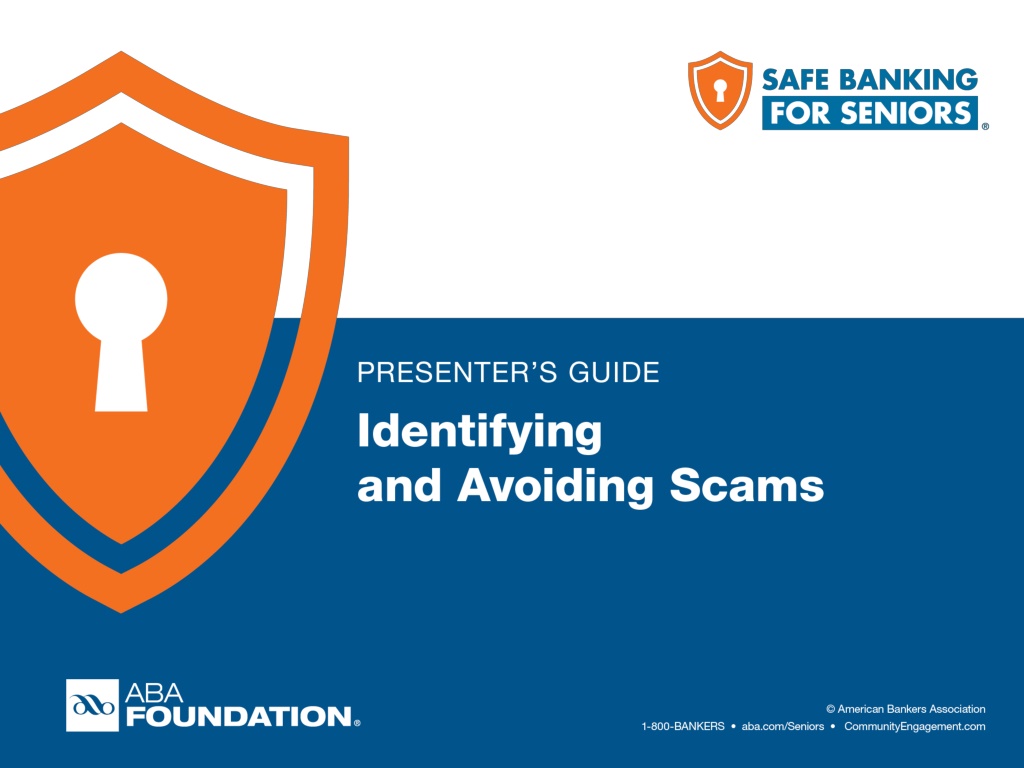


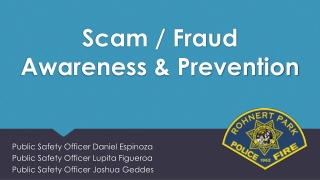

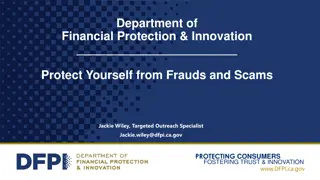
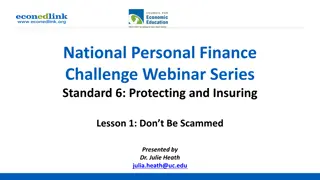
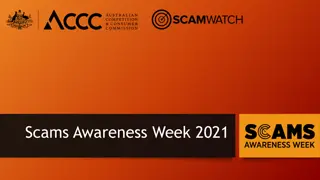
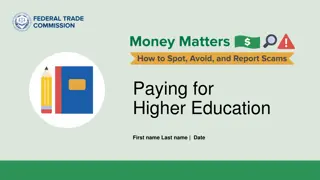
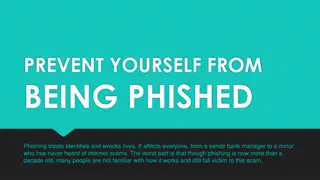
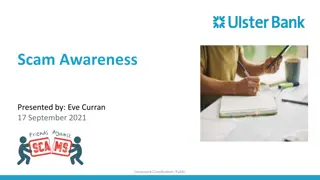
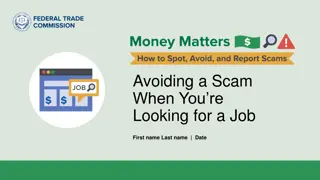
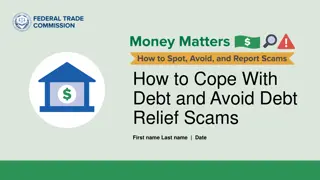
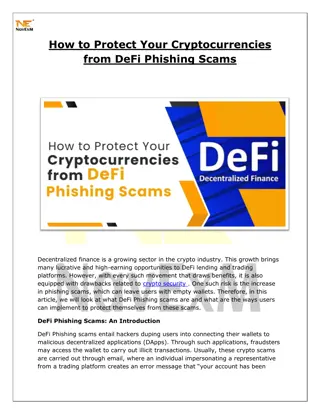
![101 Reviews How to Recover Lost Bitcoin [Scammed/Stolen Funds]](/thumb/153354/101-reviews-how-to-recover-lost-bitcoin-scammed-stolen-funds.jpg)
